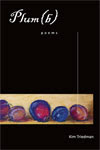
Plum(b)
poems
by Kim Triedman
Main Street Rag
Charlotte NC
Copyright © 2013 by
Kim Triedman
ISBN: 978-1-59948-408-2
Softbound, 78 pages,
$14
Review by Zvi A. Sesling
Kim Triedman lives with
open windows and with her newest volume of poetry we stand outside
her room and hear her thoughts. Reading her reveals even more and we
discover that open
windows can tell us something about hearts, open and closed.
The first part of the
book, “Plumb” plumbs the history of her house in ways one would
not expect. It is the history of two lives, doors, basements,
porches, windows, flowers, vegetables and more, all of it riveting
reading because Triedman brings you into her world, her garden, her
house, herself.
Terra Firma
Forgive me, but I don’t
know where
to place my foot.
See how the landscape
changes, just like that?
the peas, climbing; the corn?
Nothing is where one might
expect anymore, reasonably
expect, given all that
time and time
before. There are things I
know –
eyes, of course, wet well;
the smell of rain
on the tomatoes. Moons
in all their shiny outfits.
But seasons slide beneath our
feet
and high above
a hard-bill flicker
taps away
at punky time.
I would go there if I could –
the next place. I would find
a way to breathe.
In the “Signs” you
see the relationship between Triedman being unsure where to place a
foot, perhaps a metaphor for a relationship, and the geese that don’t
seem to know where to go. Is there a relationship between fear and
ambiguity? Does direction necessarily have meaning?
Signs
The hostas, for instance,
how leggy they grow
and those rickety
ladders
of lusterless blooms.
Look, I know
what it is –
an ending again, a
sorting out
of times. I can lift my head
and see
the contrails
parsing up a church-blue sky
and the old dog readies
herself
for a winter
she may
or may not see.
Beneath the nasturtiums:
dried leaves hang
like crumpled paper hats.
We have been here before, you
and I –
a north wind whispers
yellow
to the trees, and the old
wicker chair sits
waiting, putting on her poker
face.
It’s only that wayward
flock of geese –
recklessly ignoring all the
signs –
only they don’t seem to
know
which way to go.
In the second section,
“Plum,” the next layer of Triedman’s personal thoughts are
peeled to reveal more of her relationships: In Lost
In Translation, for example we see loss in
a different way:
I thought you said yes
or something like it,
something
juiced, a plum, and
time out there
calling and calling, moons
swaddling us
like silvered gauze. I
thought there were
eyes talking, mouths hearing
every single word, not to
mention
the pulse.
But enough about you.
Perhaps you didn’t know
that when I tip my head the
clouds
no longer matter, nor the
light;
that the red fruits on the
dogwood
fall without a sound. Even
that
thing we made—glitter and
fire
and silk—that thing we
never really knew
how to hold,
I have lost that too.
The final section is
“Laden” and continues her book-long theme of things as metaphors
for life, relationship and self.
Pink Lady
Fitting, perhaps—these
fruits
just beginning to turn.
I am laden.
Looking down I see
the childhoods—
dappled; apple
cheek’d.
I am the bearer, the witness
tree—
sheltering,
rooted,
unable to leave
The way athletes have
career years, Triedman has produced a career volume of poetry, which
is not to say past and future books have not or will not surpass this
one. However, Plum(b)
follows in the footsteps of those poets whose revelations about
themselves and their relationships have propelled them to legendary
status.
Ms. Triedman has written much
about a house, plants, trees and herself. Yet ultimately
this fascinating volume
of sixty-two poems is about her – good love and bad, some happy
moments and sad ones. You will see her from the outside in – and
the inside out. She has left her windows open for you to discover
her. This is a highly recommended book by an accomplished poet.
_________________________________________________
Zvi A. Sesling
Reviewer, Boston
Area Small Press and Poetry Scene
Author, King
of the Jungle and Across
Stones of Bad Dreams
Editor, Muddy
River Poetry Review
Editor,
Bagel Bards Anthology 7
Editor,
Bagel Bards Anthology 8



































